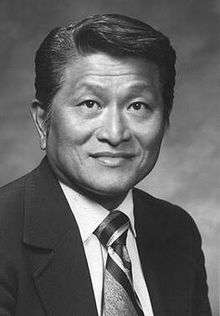Nelson Doi
Nelson Kiyoshi Doi (January 1, 1922 – May 16, 2015), was the fifth lieutenant governor of Hawaii from 1974 to 1978 in the first elected administration of Governor George Ariyoshi. Doi was a member of the Hawaii Democratic Party.[1][2]
Nelson Doi | |
|---|---|
 | |
| 5th Lieutenant Governor of Hawaii | |
| In office December 2, 1974 – December 2, 1978 | |
| Governor | George Ariyoshi |
| Preceded by | George Ariyoshi |
| Succeeded by | Jean King |
| Personal details | |
| Born | Nelson Kiyoshi Doi January 1, 1922 Pahoa, Territory of Hawaii |
| Died | May 16, 2015 (aged 93) Waimea, Hawaii |
| Political party | Democratic |
| Spouse(s) | Eiko Doi |
| Children | 2 |
| Profession | Judge, Politician |
Early and Legislative Years
Doi attended the University of Hawaii, where he was president of the Associated Students of the University of Hawaii from December 1944 to June 1945.[3]
Doi began his political career at the 1950 Hawaiʻi State Constitutional Convention that drafted the first state laws for Hawaiʻi that went into effect in 1959. During that Convention, Doi noted "a frustration that began to ferment" amongst the delegates.[4] In the 1954 election, that frustration led to a huge victory for the Democrats, who seized control of what had been a territory dominated by Republicans. Doi, representing Hawaii Island, was one of the victorious Democrats. Other Democrats first elected in 1954 included U.S. Senator Dan Inouye, former Governor George Ariyoshi, the late U.S. Senator Spark Matsunaga.
After that victory in 1954, Doi then served in the Hawaii Territorial Senate in 1955-1959 and then in the Hawaiʻi State Senate from 1959 to 1969. During his tenure in the Senate, Doi was frequently at odds with Governor John A. Burns and Senate Democratic leaders.[5]
In 1968, Doi was one of 82 delegates to the Hawaii Constitutional Convention held at McKinley High School. Among the issues addressed at the Convention were reapportioning legislative districts, mandating an annual 60-day legislative session, lengthening the terms of judges, authorizing collective bargaining for public employees, strengthening privacy rights for individuals, enhancing county home rule, and creating the Office of Hawaiian Affairs. Other prominent political figures who were among the delegates were George Ariyoshi, Frank Fasi, and Patricia Saiki.
Judiciary and Lieutenant Governor
In 1970, Doi left the Hawaiʻi State Legislature, after being appointed to the Hawaii State Judiciary as a circuit court judge where he served for five years. Also in 1970, Doi entered the race for Lieutenant Governor of Hawaii, at first aligning himself with fellow Democrat and gubernatorial candidate Thomas Gill. After disagreements with Gill on commitments on political appointments, Doi decided to run independently.[6] Ultimately, both Gill and Doi were defeated by John A. Burns and George Ariyoshi, respectively.
In 1974, Doi was chosen as the running mate for George Ariyoshi. Fourteen months earlier, Ariyoshi, the previous Lieutenant Governor, became Acting Governor upon the incapacitating illness of longtime Governor John A. Burns. Ariyoshi and Doi emerged victorious, becoming the first-ever Japanese Americans to hold simultaneously the Governor and Lieutenant Governor posts of any state in the U.S. Doi was the second Japanese American to hold the position of state Lieutenant Governor.[7]
Later years
After his service as Lieutenant Governor, Doi ran for Mayor of Honolulu and was defeated by Frank Fasi. Doi also ran in the 1977 Honolulu Marathon, finishing in 4 hours, 30 minutes, and "besting his wife by just one minute".[8] In 1977, he also was appointed to then-territorial High Court of the Marshall Islands. Upon his retirement from that court, Doi taught at various schools in Japan. Doi returned to Waimea on the Big Island of Hawaiʻi where he helped build the North Hawaiʻi Community Hospital.
References
- Lawrence Kestenbaum (July 1, 1996). "Doi, Nelson K". The Political Graveyard. Retrieved October 10, 2013.
- "Former Lt. Gov. Nelson Doi dies on Hawaii island". Star Advertiser. 18 May 2015. Retrieved 27 May 2015.
- Yim, Susan (June 1981). "Look Where the Presidents Have Gone" (PDF). Archived from the original (PDF) on 2008-09-05. Retrieved 2019-06-14.
- Arakawa, Lynda; Pang, Gordon Y.K. (13 June 2004). "GOP aims for own revolution". the.honoluluadvertiser.com. Retrieved 2019-06-14.
- McDannald, Alexander Hopkins (1970). The Americana Annual: An Encyclopedia of Current Events. University of Michigan.
- Coffman, Tom. (2003). The island edge of America : a political history of Hawai'i. Honolulu: University of Hawai'i Press. ISBN 0585478856. OCLC 53481907.
- Niiya, Brian (1993). Japanese American History: An A-To-Z Reference from 1868 to the Present. Facts on File. p. 129. ISBN 0816026807.
- Donnelly, Dave (December 15, 2002). "1968: Doris Duke chips in to save Maui's 7 Sacred Pools". archives.starbulletin.com. Retrieved 2019-06-14.
- Ariyoshi, George R. With Obligation to All. University of Hawaii Press, 1997.
- Chapin, Helen G. Shaping History : The Role of Newspapers in Hawai'i. Honolulu, HI, USA: University of Hawaii Press, 1996. p 309.
- "Former Lt. Gov. Doi still talking about politics in his retirement." Honolulu Star-Bulletin. 18 Oct 2003. http://starbulletin.com/2003/10/18/news/whatever.html
- Van Dyke, Jon M.. "Time for a tune-up." Honolulu Advertiser. 18 May 2008. http://www.honoluluadvertiser.com/apps/pbcs.dll/article?AID=/20080518/OPINION03/805180336/1110/OPINIONFRONT
| Political offices | ||
|---|---|---|
| Preceded by George Ariyoshi |
Lieutenant Governor of Hawaii 1974 - 1978 |
Succeeded by Jean King |